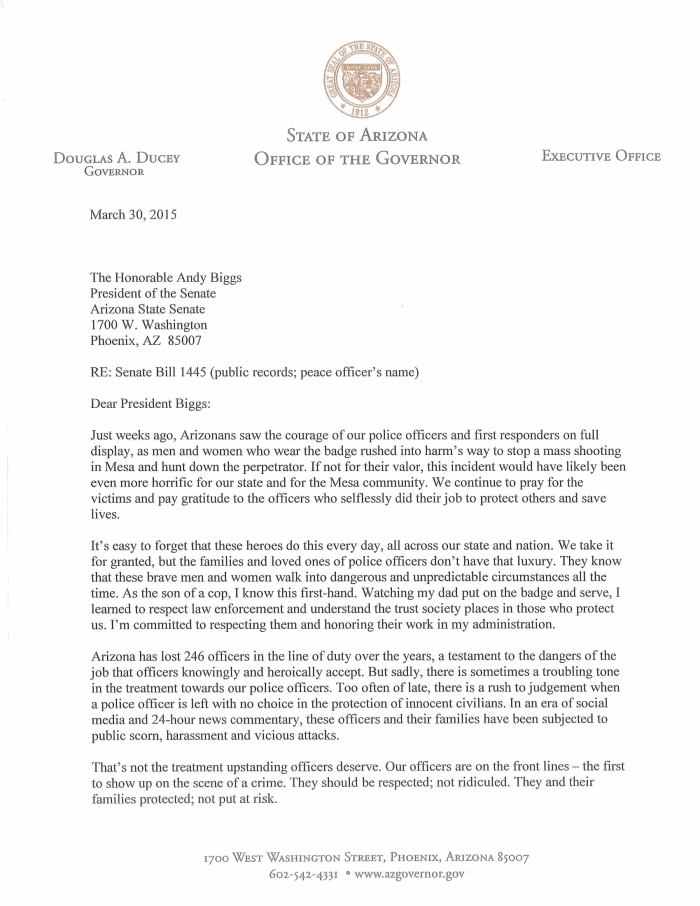
A controversial bill that aimed to prohibit law enforcement in Arizona from releasing the names of officers involved in shootings until 60 days after the incident was vetoed Monday by Gov. Doug Ducey.
Ducey said his No. 1 goal was to protect officers and their families, and the "arbitrary" 60-day timeframe didn't help police. In a letter explaining his decision, the governor also noted that Arizona law already allows local police departments to weigh officer safety as they decide when to release names.
In one recent case, the Phoenix Police Department waited seven days after a shooting to release the officer's name. If a substantial safety or other public concern arose, Ducey said, a department could wait longer.
"Under current law and in practice, chiefs have the authority to make decisions in the best interests of their officers and departments," Ducey said. "Their concern, and mine, is that setting an arbitrary 60-day benchmark for release of names would limit their ability to best manage these often tenuous situations and result in unintended consequences."
The state's largest newspaper, The Arizona Republic, and the Arizona Association of Chiefs of Police wrote letters to Ducey last week urging him to veto Senate Bill 1445, which would apply to officers involved in shootings that result in death or injury.
The bill, sponsored by state Sen. Steve Smith, passed in his chamber last week on a 20-8 vote. The bill initially asked for a 90-day waiting period, but the House of Representatives cut that to two months. During the 60-day period, an officer's record and disciplinary hearing could be released, but all personal information would be withheld.
Proponents of the bill argued that it would help protect officers from harassment and threats after fatal police shootings.
"The simple fact remains that we live in a world where misinformation can put everybody in jeopardy, especially police officers," Sen. John Kavanagh said on Thursday while debating the bill. "And until we get those facts straight, we need to shield those cops and their families from being assassinated by lunatics or political zealots."
In Arizona's Pinal County, a deputy received threats after he was involved in a fatal shooting in January 2014, Chief Deputy Steve Henry told BuzzFeed News. The deputy's home was placed under 24-hour watch for two weeks.
"There tend to be a lot of inaccuracies in early reports," Henry told BuzzFeed News. "If we could have kept that deputy's name out of the media for a certain amount of time, for at least for a cooling-off period, then some of the negative publicity would have been mitigated and we could have focused entirely on the investigation" said Henry.
Opponents of the bill argued that if it became law, it would significantly increase tensions and potential mistrust between police departments and the communities they are sworn to protect, especially minorities.
Adriana Garcia-Maximiliano, of the Center for Neighborhood Leadership, works with low-income people, minorities, and immigrant communities in Phoenix on community oriented policing and problem solving. She feared the bill would strain the relationship between police and local communities that she and her colleagues work to maintain.
"Waiting 60 days to give communities information about a shooting or violent police encounter will not be an effective 'cooling-off period,'" Garcia-Maximiliano told BuzzFeed News. "The secrecy will only escalate the problem."
Donald Harris, the President of Arizona's Maricopa County NAACP branch, told BuzzFeed News that the bill was "an encroachment on our rights that is taking away the freedoms we fought for in the country."
The proposal also attracted the ire of protestors. Last week, for instance, "well over 200 people showed up to protest in front of the capital," Harris said.
"This country is based on Freedom. This bill limits the knowledge of information to the public" #SB1445 @mixedvoces
Protesters chanting "no justice, no peace, no secret police," asking @dougducey to veto #SB1445
The Arizona Association of Chiefs of Police also opposed the bill, saying that it would take control away from local department heads, who currently make decisions regarding when to release information about their officers.
"We have really strong protection in Arizona law that allows police chiefs to withhold names if there are safety issues," ACLU Arizona Executive Director Alessandra Soler told BuzzFeed News.
"We want our local police officers to choose when they release the information," Garcia-Maximiliano noted. "It's up to them to make a decision based on each specific case and the relationship that law enforcement agency has with their own community."
While such laws exist, freedom of information requests from media can force police departments to release names of officers involved in shootings before they are ready, Cheif Deputy Henry told BuzzFeed News. The proposed law would have shielded departments against such requests.


